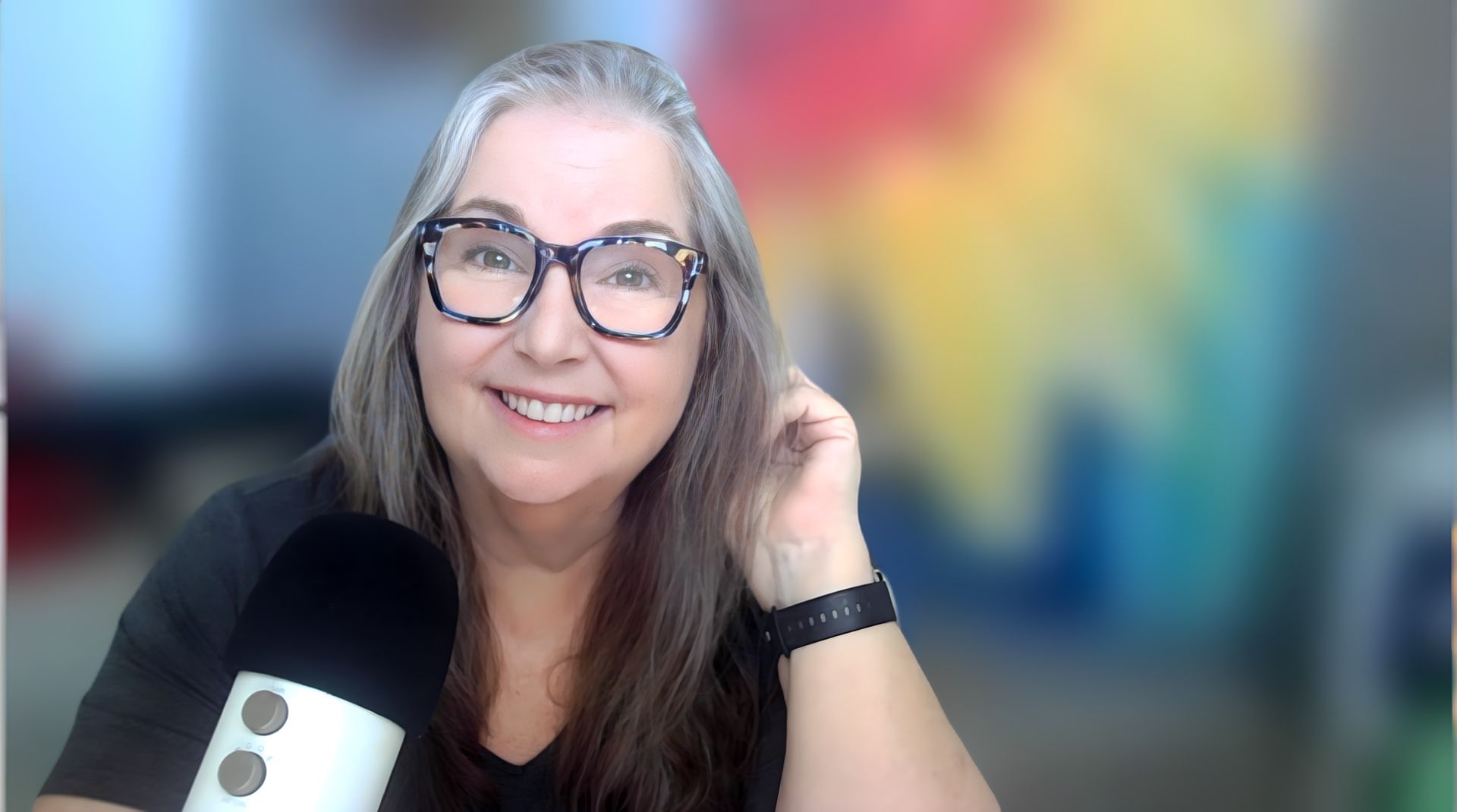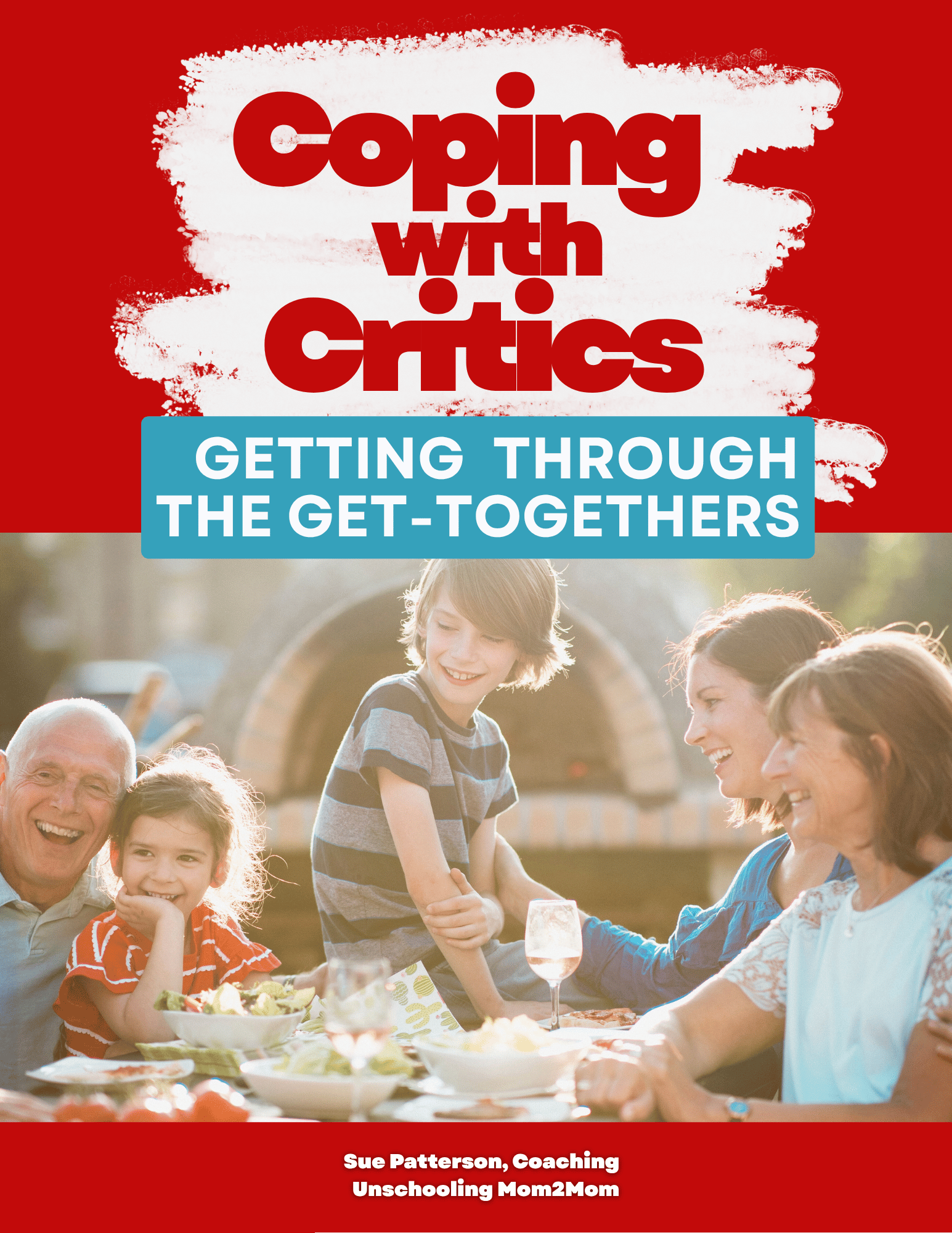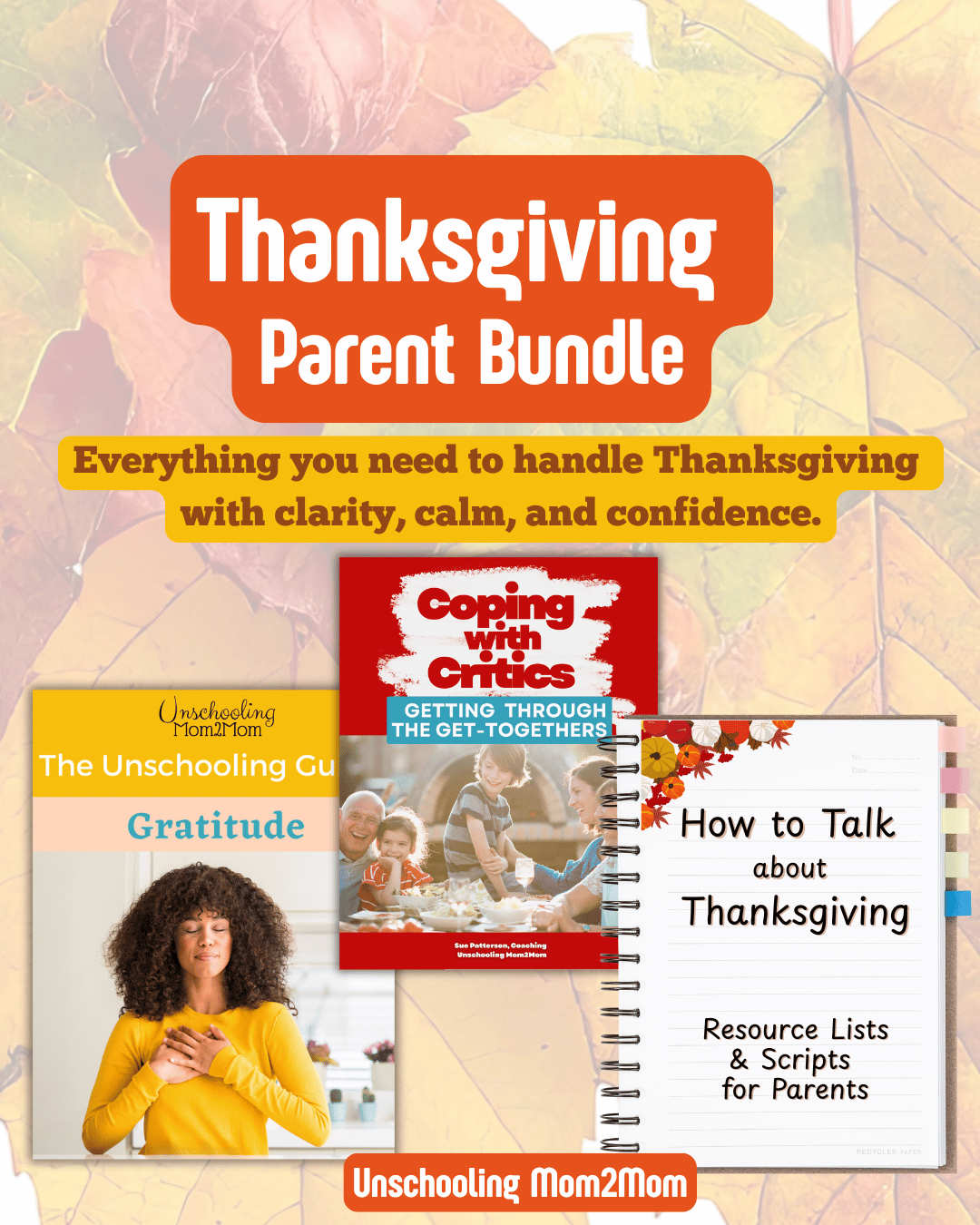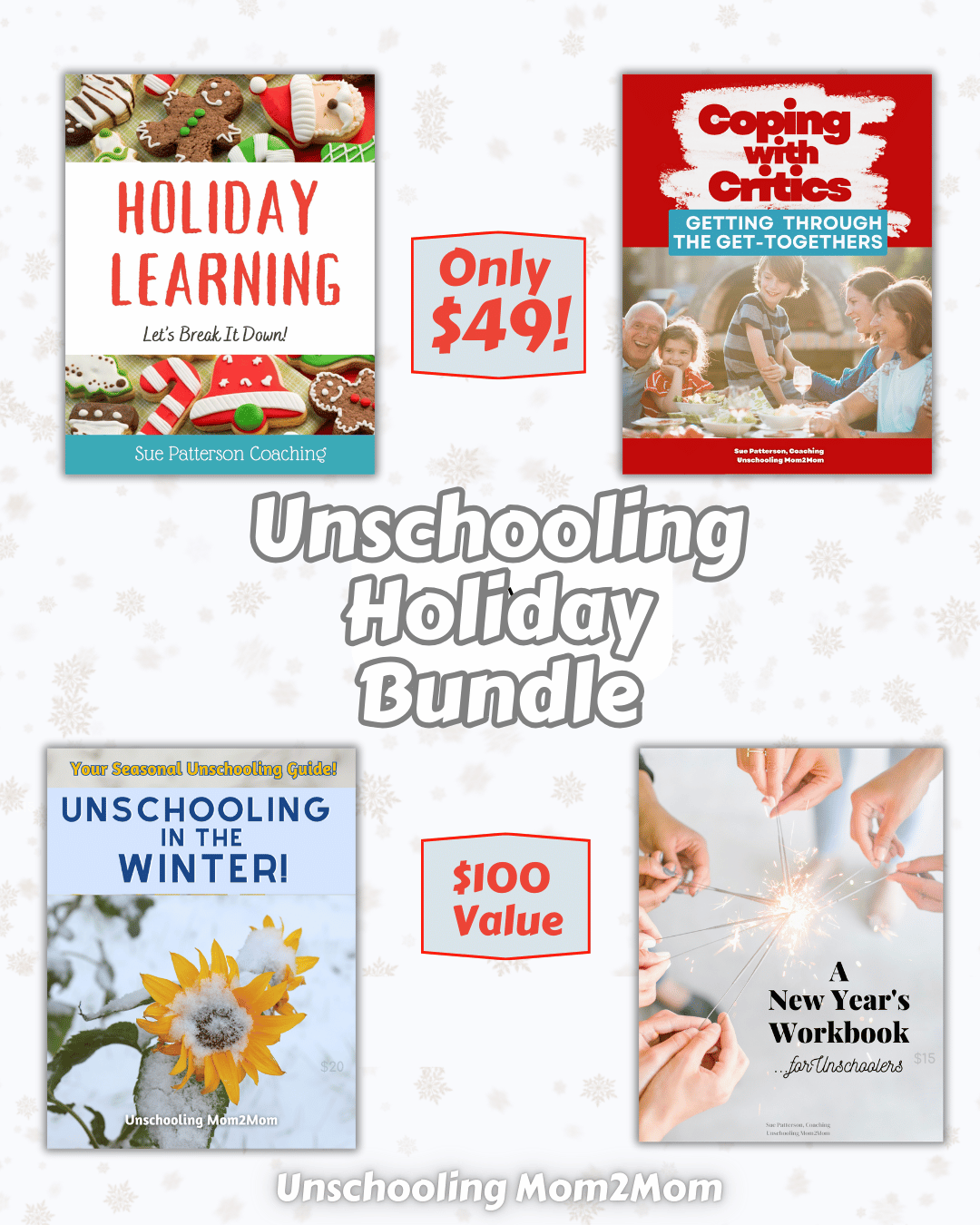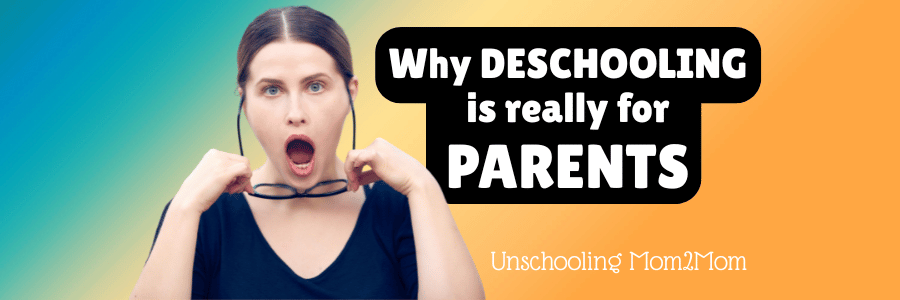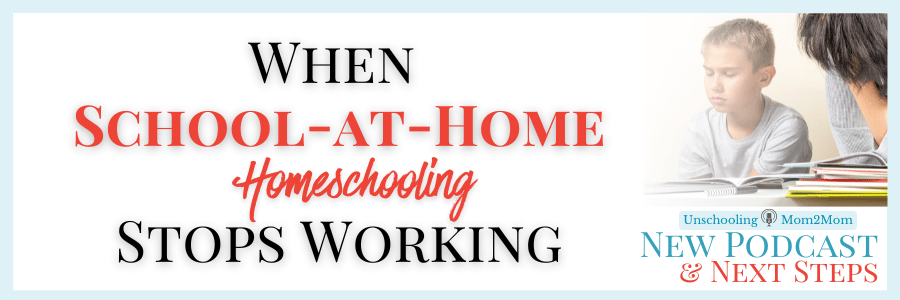Handling Critics During the Holidays
- Why criticism hits harder during early deschooling
- How quiet progress at home gets dismissed at gatherings
- What triggers old fears when relatives question your choices
- How to stay steady and protect your calm during the holidays
Holiday Critics
5 Tips to Help you Stay Calm Under Pressure!
Podcast Transcript:
Handling critics during the holidays can be one of the hardest parts of unschooling — especially when you’re still in the deschooling phase and trying to build confidence in your choices. At home, you’re finally starting to see real progress: calmer days, more curiosity, deeper connection, and a child who’s slowly recovering from the pressure of traditional schooling. But when you walk into a holiday gathering, those quiet wins often get dismissed or ignored, and family members may question your parenting, your child’s learning, or the idea of unschooling altogether.
This episode explores why criticism feels so intense when you’re still deschooling, how family comments can trigger old fears, and why early unschooling makes you especially sensitive to judgment. We’ll talk about what’s really happening beneath those uncomfortable conversations, why your relatives may misunderstand what they’re seeing, and how you can stay grounded, confident, and connected — even when people don’t support your choices. If you’re bracing for tough conversations at Thanksgiving, Christmas, or any holiday get-together, this episode will give you clarity and tools to navigate it with far less stress.
Before we get any further, I’m Sue Patterson, and this is the Unschooling Mom2Mom Podcast. I’m bringing weekly peptalks to parents who have stepped away from schools and the school-approach to homeschooling. Take a second and subscribe to the podcast - it helps us spread the word that families DO have options when it comes to the educational choices for their kids.
So this, week we’re talking about something that comes up every single holiday season — and honestly, all year long:
What do you do when you finally feel steady at home... and then you step into a gathering full of people who don’t understand unschooling?
If you’ve been dreading those questions, those eyebrows, those comments — let’s breathe together. You’re not alone, and nothing is wrong with you.
Let’s talk about what’s really happening underneath all of that.
Inside Your Home: Real, but Quiet, Progress
When we’re at home with our kids, we’re living in this quiet little ecosystem where real changes are happening — not big, flashy, trophy-worthy things, but subtle shifts that matter deeply.
Maybe your child is finally relaxing after years of pressure.
Maybe they’re smiling more, sleeping better, asking questions again.
Maybe they’re starting to feel safe enough to be themselves.
Maybe
you are softening, reconnecting, feeling more at ease.
There’s no award for:
“Finally exhaled today,”
“Talked openly in the car,”
or
“Had a tiny spark of curiosity.”
But
you see it.
You’re starting to understand how real learning actually works.
Unschooling parents learn to recognize these quiet wins — the healing, the trust-building, the moments where your child feels good in their own skin.
This is the real progress.
This is what matters.
Then You Leave the House
So of course it feels jarring — even heartbreaking — when you walk into a holiday gathering…
and suddenly you’re surrounded by people still using the
old measuring stick.
You’re noticing connection.
They’re looking for test scores.
You’re watching confidence grow.
They’re looking for competitive achievements.
You’re focused on emotional safety.
They’re focused on performance.
You’re celebrating healing and curiosity.
They’re scanning for something impressive to report back to the family group chat.
And it hurts — not because you’re wrong...
but because you’ve changed how you see progress, and they haven’t.
You’re living by a new framework.
They’re measuring by the old one.
Of course it creates tension.
Of course it feels vulnerable.
Why Their Comments Hit Hard (The Real Reason)
And here’s the piece most parents don’t realize:
Critics feel louder when we are still deschooling.
It’s not about an “old version of you getting activated.”
It’s that you’re still becoming steady in this new way of seeing learning.
So when someone questions you, or doubts you, or makes a passive-aggressive comment…
their words land right on the parts of you that are still tender.
Not because they’re right —
but because you’re still unlearning old beliefs.
You’re still learning to trust what you see happening at home.
Those reactions you feel?
That wobble?
That tiny panic?
They’re not signs you’re making the wrong choice.
They’re signs you’re still building your foundation.
And once that foundation is solid — truly solid — those exact same comments won’t shake you at all.
The critics don’t change.
You do.
When you are grounded and clear, their opinions lose their power.
Why Critics Want Everything to Stay the Same
And then there’s this piece:
We leave our homes — where we’re intentionally learning to look at life differently — and we walk straight into conversations with people who want everything to stay the same.
They’re not trying to understand your changes.
They’re trying to pull you back into the version of parenting that makes sense to them.
Back to what feels predictable.
Back to the system they trust.
And that pull can feel strong.
But it doesn’t mean you’re wrong.
It means you’re growing — and they haven’t caught up yet.
Here’s the piece most parents don’t realize:
Unschooling success is really all about preparation.
Not rigid planning.
Not controlling outcomes.
But preparing yourself — emotionally and practically — for the humans you’re about to encounter.
Because by the time a holiday gathering rolls around, you actually know more than you think you do.
You’ve been observing your child.
Paying attention to what dysregulates them, what calms them, what overwhelms them, what lights them up.
You know their preferences.
You know their breaking points.
You even know the look they get right before frustration hits.
This is the result of the
real work you’ve been doing at home — watching, noticing, understanding.
You’re not trying to jam square pegs into round holes anymore.
So when you’re heading into a gathering, it becomes less about “hoping for the best” and more about anticipating the possibilities.
Not predicting disaster — but reading the landscape.
- Who will likely ask questions?
- Which rooms or activities might overwhelm your kid?
- Where can they retreat if things get loud?
- Do they need a plan, a buffer, a signal to leave?
- Do
you
need a phrase ready so you’re not caught off guard?
This isn’t anxiety — it’s skill.
It’s what partnered parenting actually looks like.
You can support yourself in that preparation in a few key ways:
1. Have a couple of go-to phrases ready.
This isn’t about defending unschooling — it’s about staying out of the hot seat.
When you’re prepared with a calm, confident sentence or two, you don’t get pulled into explaining or debating.
You simply redirect the conversation and keep your energy protected.
I do have a guidethat can help prepare you for these situations. Not with scripts to memorize, but with options you can adapt to fit your tone. Think of it as your emotional carry-on bag — everything you need for the bumps in the road. It’s in this week’s Thanksgiving Parent Bundle and also the Holiday bundle. I’ll link to these in the show notes.
2. Have a plan for the kids (because you know them best).
If you watch closely, you can see the signs before things slide sideways.
Maybe they need:
• a full tummy before you arrive
• their headphones
• something to fidget with
• a plan for where to go if they need a reset
• a heads-up about who will be there
• reassurance that YOU are available if they need you
• permission to stay close
• permission to take breaks
This is where your unschooling skills shine — you understand your child in ways nobody else in that room does.
And you can show up for them intentionally.
3. Decide what your boundaries are ahead of time.
Not the dramatic kind — just the quiet, steady ones.
• What questions will you answer?
• Which ones will you gently redirect?
• Which ones aren’t up for discussion at all?
• How long do you realistically want to stay?
• What’s your exit plan if someone pushes too hard?
Boundaries feel so much safer when they’re thought through in advance.
4. Create emotional armor that comes from truth, not defensiveness.
When you walk in knowing:
- “I know my child.”
- “I see progress they don’t see.”
- “I’m learning and growing too.”
- “This is a long game — and we’re on track.”
...you move through the room differently.
Calmer.
Steadier.
Harder to rattle.
And this steadiness is exactly what the guide reinforces — it helps you understand why people criticize, how to respond without taking the bait, and how to stay in your lane without losing your cool.
You don’t NEED them to approve of what you’re doing. It’s ok to disagree. You’re a grownup too.
5. And finally… give yourself grace.
If you’re feeling shaky — if every comment feels like a spotlight — remember:
This isn’t a sign that unschooling isn’t working or you’re not cut out for this.
It’s a sign that
you are still in the middle of changing the way you see everything.
You’re not failing or behind, if you feel wobbly.
You’re not supposed to be “immune” to criticism yet.
You’re still deschooling.
You’re still building that inner foundation.
Your preparation isn’t just practical logistical — it’s emotional.
And every bit of this work counts.
I mentioned the new guide Coping with Critics: Getting Through the Get-Togethers that can help you get yourself AND your kids for the next gathering with family and friends.
You don’t need perfect responses, you just need a tool to help you walk into these situations fully prepared for whatever you’re going to be facing.
I get it, you’re not on steady ground yet with this unschooling thing. That’s ok. But this can help you feel supported as we move through the world with our friends and family who don’t really get what we’re trying to do.
You’ll find it in both the Thanksgiving Parent Bundle and the Holiday Bundle, depending on when you’re listening to this, and which season you’re walking into.
Take what you need.
Support your future self.
